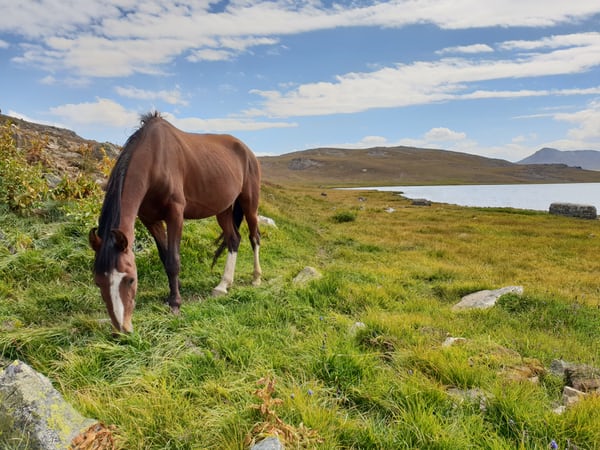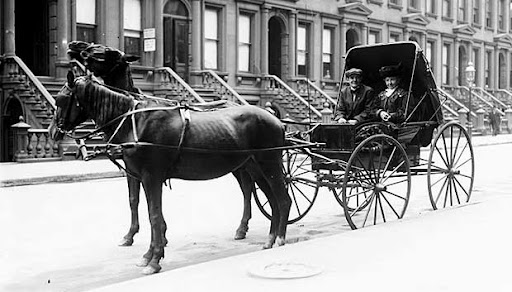 |
||||
|
The Environmental Impact of Horses for Transportation
How environmentally friendly are horses if used for transportation?
Note - Yes, we researched all the prices, consumption, etc listed here. If you don't believe us just go get a subscription to a horse aficionado magazine to see what other costs are involved with owning a horse or talk to someone who actually owns a horse. Horse Sport Magazine or something similar will have statistics on such things, although most of what we researched actually came from university websites. Well... Not as great as you might think. The average lifespan of a horse is 25 to 30 years, during which they need to fed and watered, and they produce an abundance of CO2 during that time period. Meanwhile the average life expectancy of a vehicle in Canada is 12.88 years, compared to 15.36 years in the USA. (Canadian cars on average break down sooner due to salt on the roads during the winter causing more deterioration on the underside of the car, more car crashes on icy roads and other factors. Americans are also more likely to buy an used car and repair it, which lengthens the average lifespan of cars.) Due to modern urban planning horses no longer make sense any more. The roads are not designed for horses wearing horse shoes. Or much practical sense either. There aren't blacksmiths on every corner ready to replace a horse shoe. Or stables where you can tie up your horse to be watered and fed until you return. In fact when you start calculating large numbers, horses are more problematic than cars. The amount of manure alone, for a hypothetical city of say 4 million people with 1 million horses being used for transportation, would be impractical. It would require manure collectors to clean the streets to collect the 9.1 tons of manure each horse produces each year. That is 9.1 million tons of manure for such a hypothetical city (let's call it Equintopia). All that manure has to go somewhere. Using it for fertilizer makes a bit of sense, if you don't mind transportation 9.1 million tons of manure into the countryside to be used on farms - which in Equintopia means the horse manure means you need to transport it using horses, as opposed to something more practical like a transport truck or a train. Asides from the manure production, what else do horses need? Each horse needs about 10 to 20 pounds of fresh bedding each day. This works out to 2.7 tons per year of fresh straw, which needs to be transported and delivered to the many residents of Equintopia. All 2.7 million tons of it. You would need a lot of farms producing nothing but fresh straw to be used for fresh bedding for the horses. Oh and the bedding needs to be thrown out afterwards. So that is another 2.7 million tons of straw that needs to be re-transported back to the countryside because it is now basically trash and needs to rot down over the winter. Not to mention horse urine, some of which was absorbed by the bedding... and some was not. So there would be the smell of 1 million horses pissing everywhere in Equintopia. Between the urine, the manure and the straw there would be millions of tons of waste each year. Every year. It needs to be collected, transported and disposed of... Or else your ground water will become contaminated with e.coli and other bacteria that horses frequently carry. Or the diseases that could spread from horse manure to horse manure just laying around in the gutters while street cleaning crews haven't yet removed it. To say nothing of the smell. And what about the dead horses? The average horse only lives 27.5 years, so we're looking at 36,000+ dead horses per year. Plus working horses have a lesser lifespan, so it might be closer to 40,000 to 50,000 dead horses per year. Well, traditionally you could just use the horse meat to make Montreal Smoked Meat (these days it is usually made with beef, but traditionally it is made of horse meat)... But that only solves part of the problem with the horse carcasses. What about the bones? The internal organs? The leather skins? You would need whole industries to deal with such things, otherwise a lot of it would go to waste. That would mean a lot of people in Equintopia would be wearing horse leather jackets. Kinda creepy if you ask me. I wonder what the horses would think of it? We haven't even talked about food and water yet. Horses need to eat. Roughly 1.4 tons of oats and 2.4 tons of hay each year, on average. So 3.8 tons per year. Except some sources (Rutger's University) say that horses actually consume 4.56 tons per year, so there is some debate about how much food they actually eat. Still let's assume it is the lower number (because some horse owners are cheap). 3.8 tons x 27.5 years. 104.5 tons during the average lifespan of a horse. Assuming they live that long. Again, working horses tend to die sooner so it might be less than that. All that food needs to be grown and transported. So there's more land requirements, and more transportation costs involved. Horses also need to drink between 5 to 10 gallons per day, fresh water... Roughly 19 to 38 liters per day. For the 1 million horses of Uquintopia that is roughly 28.5 million liters per day. This would put a lot of stress on the local sewer system and water supply. The average American uses 101.5 gallons of water per day (384 liters), so an extra 28.5 liters per household isn't a lot, but all that extra water needs to come from somewhere so Equintopia better have easy access to lots of fresh water. If the city is in an arid part of North America then they will have water shortages (like they already do in the American south-west). Horses also need vets, which are expensive, and a city of 1 million horses would need a lot of vets. That one million horses would also be expelling a lot of CO2, day and night, 24 hours per day, every day, even when not being used as a work horse for transportation. Even on a smaller scale, say a village of 1000 people and only 250 horses, this is still impractical. It might have made sense in 1850 when there were lots of blacksmiths handy, and there were plenty of farms and farmers (and very few cities), but in 2021 this isn't practical any more. The environmental costs of food, water, bedding, manure removal, etc... is staggering. It is amazing that cities back in the 1850s even managed to put up with the smell. Also we haven't yet talked about road maintenance, the cost of horse shoes and black smith forges, the environmental impact of wagons, carts, carriages... Meanwhile the average American driver uses 656 gallons (2483 liters) of fuel, gasoline or diesel per year. That is roughly 1,838 kg (4052 lbs) if you prefer to weigh the consumption in an effort to calculate the carbon footprint. But that is still far less than the total consumption required for 1 horse. And basically all this goes to show is that cars are technically more environmentally friendly than horses, and more economical. It is no wonder horses these days are primarily owned by the wealthy - the type of people who either enjoy horses recreationally, and also the people who use horses for show jumping, racing, making Western films, fantasy films, historical films, etc. Honestly, if a person really wants to use less of a carbon footprint they should get a bicycle or a recumbent. For the distances people are willing to travel by horse they could do the same thing on a bicycle or a recumbent. A bicycle is a lot more sustainable and isn't pumping out CO2 constantly. A horse, even at a moderate trot is only doing about 12 mph (19 kmph), a speed that many cyclists can maintain easily unless climbing a steep hill. So if someone really wants to "help the environment" your best bet isn't a horse. It is a bicycle. Let's leave the horses to the rich people who can afford to pay for all the financial costs. The average annual vet bill for a horse in the USA is $11,040 USD. Save your money, save the environment, just buy a nice bicycle instead.

|
|
|||
|
|
||||
